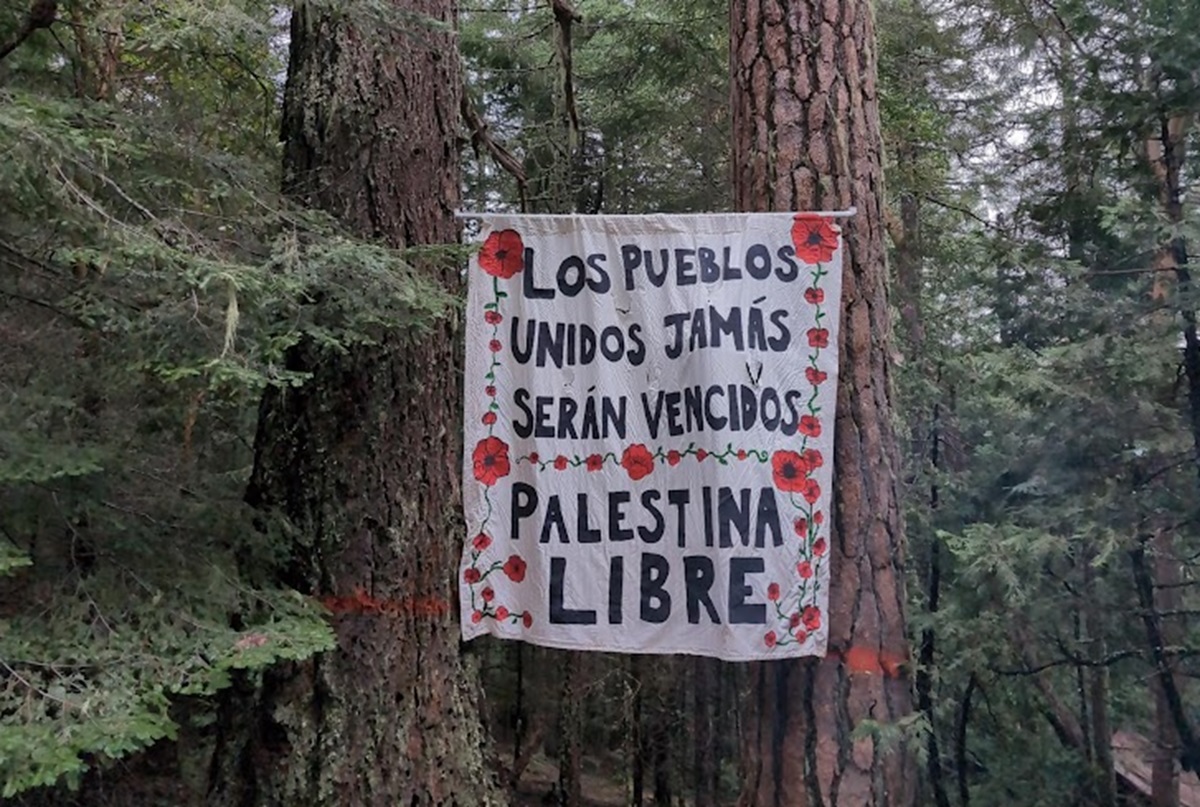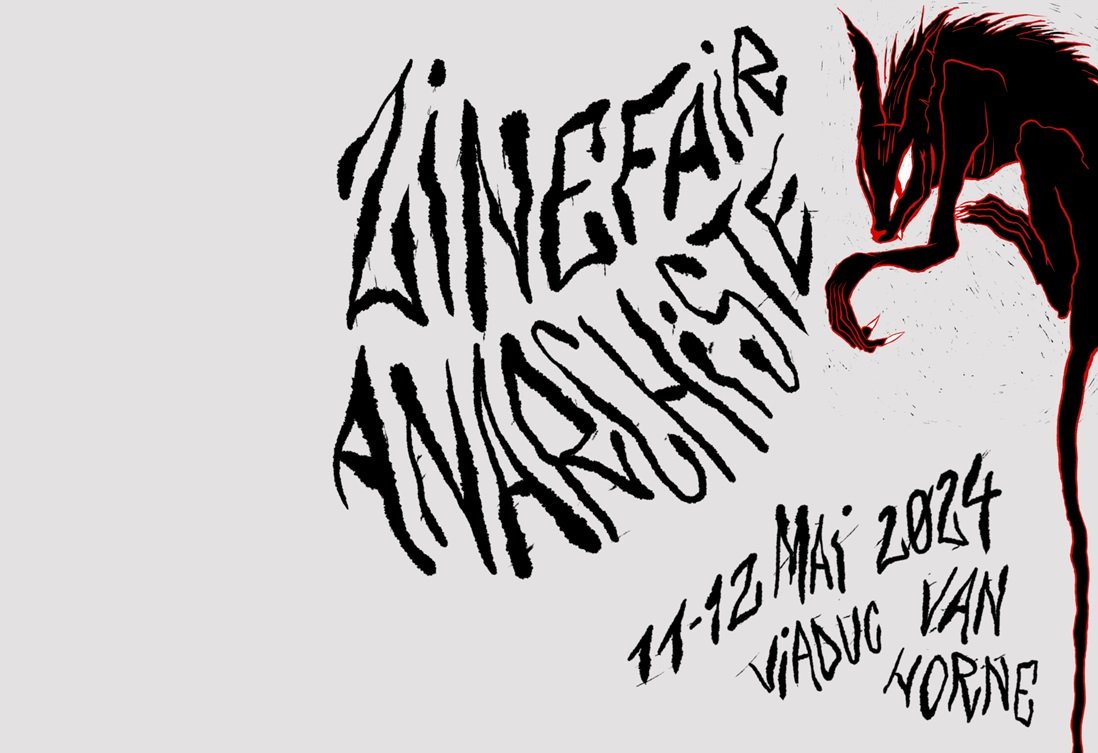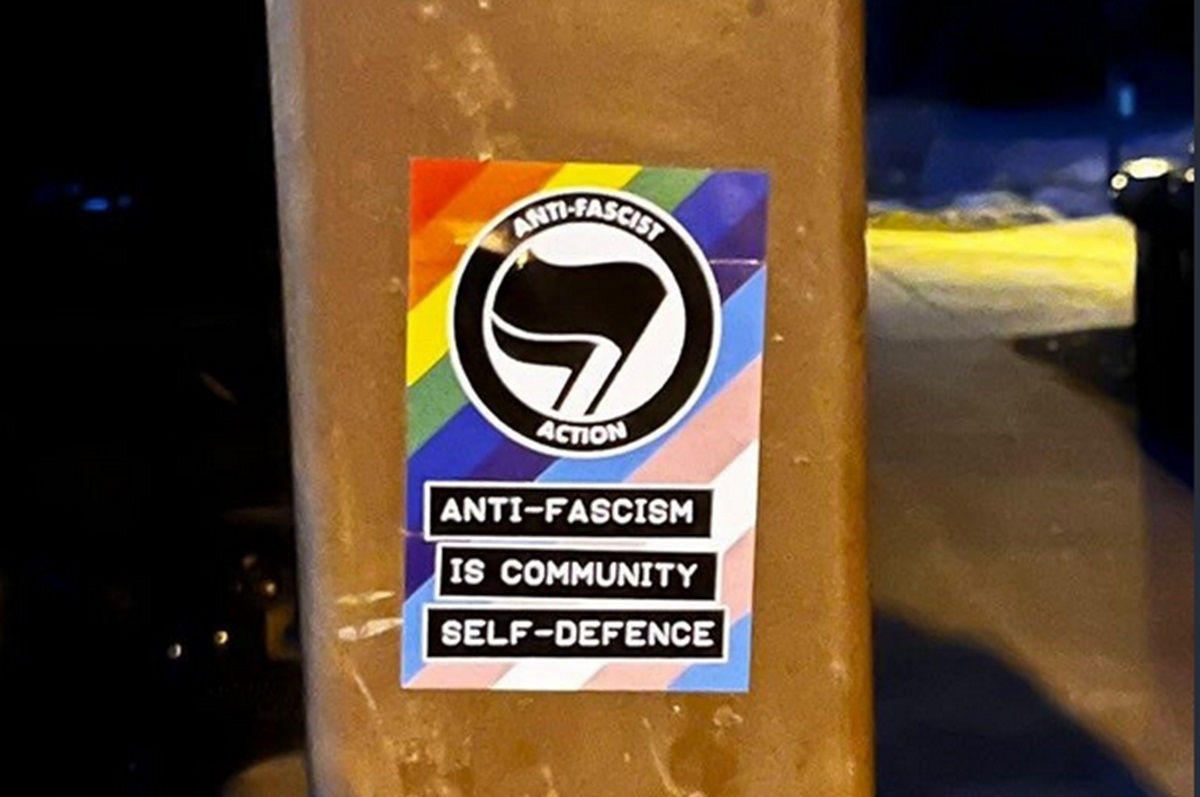Filed under: Anarchist Movement, Capitalism, Education, Northeast, Publication, Video
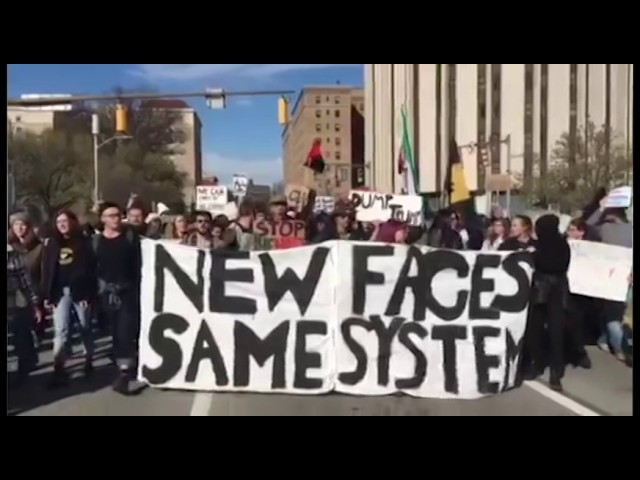
Our material environment arranges life into a procession of neat little rituals. All that is possible or desirable is administered according to the routines built into Campus Life.
No one is quite sure why the lobby of Litchfield Towers is first and foremost a place to glide through in passing, to dodge the solicitations of student clubs, or to purchase coffee. Nor is there much reason to question such fixtures of everyday life; these structures are simply taken for granted as part of our unspoken consensus on reality.
And who really even gives a shit in the first place?
Well, try using a university space for even slightly different purposes and you’ll find out pretty quickly. After all, there are people whose paychecks are predicated on having to give so many shits that they will physically retaliate against any breach in routine. But uniforms are easy targets, rhetorically speaking. The relations encoded in the blueprints of the places they are paid to defend, on the other hand, are what reproduce normalcy.
For an education that liberates.
For a classroom that no longer spectates.
For house parties where Pitt students,
workers, and faculty can throw down together.
For a campus culture that terrifies Pitt’s board of trustees.
For a campus that celebrates life.
For a University Against Itself
Back in the spring of 2015, a couple friends brought hot food, some boxes of clothing, toiletries, books and zines into the lobby of Litchfield Towers to give away for free. This was the same school year that the University of Pittsburgh’s administration decided to raise tuition, organize a food bank for its students as a sort of half-assed apology, and then jack up tuition a second time just a few short months later. Needless to say, shit was getting rough for a lot of kids at Pitt.
I thought using a student space to share stuff was a cool idea, so I grabbed a few sweaters I could spare on my way out the door that morning. But before I even made it to campus, our group chat started blowing up.
My friends had been kicked out within half an hour of setting up. By the time I got there, a Pitt cop was already chasing them out the door, frantically squawking into his radio, flailing his free arm and demanding they come back to face the consequences.
“Must fulfill duty to defend Law and Order,” said the robot in his head.
“Finally, some action!” thought the man behind the uniform.
The Task at Hand
Rather than deferring to age and experience, we can sharpen our analytical skills through discussion groups, general assemblies oriented towards communication as an end in itself, and more writing, theorizing, and critique. These are the processes that enable a crew, a community, or a distributed network of subversives to gain mutual understanding and refine their analyses in order to speak precisely about what is happening, what must be done, and—most importantly—how to do it. It is essential to find the time and space to do this with people you trust, whose analysis you also trust, and ideally who come from a range of backgrounds and experience.
– “After the Crest: Part IV,” Rolling Thunder #11
This is not a populist appeal. Nor is this a program to be enacted by some specialized minority of student organizers, “social justice” activists, or would-be insurgents. This issue of Filler is about starting a conversation.
In Pittsburgh, we’ve seen a small but exciting resurgence in everything from reformist mass mobilizations to insurrectionary shenanigans. I have no clue what might go down next semester, but some shit seems to happen over and over again. There are patterns, if you’re looking for them; Campus Life has a way of dissolving back into routine.
An effective analysis of our situation, and a healthy bit of introspection and reflection on our personal objectives, might offer a vision for momentum. But no analysis is fundamentally correct, and certainly no analysis is correct outside the context in which it is conceived. A correct analysis is simply whatever interpretation of social reality best informs our efforts to achieve a given objective. Ideas and conflicts persist, but radical youth scenes, and therefore coherent strategies, are as transient and short-lived as our attention spans.
The conceptual frameworks proposed in this zine are meant to work in tandem with the organizing that folks are already engaged in. The task at hand is to figure out, for ourselves, how to conceptualize and organize the University struggle: what entrances are we neglecting, and where might we find points of departure from which to rekindle the excitement we once felt? After all, the shit we pull off today will determine both starting points and horizons for the next generation of Pitt students.
This zine is also an attempt to contextualize Pittsburgh’s nascent student movement, to frame the coming unrest in a way that just might make some careerist liberal think twice before mentioning their time as club president on a future résumé.
~ I ~
Stories We Tell Ourselves
Organizing has never meant affiliation with the same organization. Organizing is acting in accordance with a common perception, at whatever level that may be. Now, what is missing from the situation is not “people’s anger” or economic shortage, it’s not the good will of militants or the spread of critical consciousness, or even the proliferation of anarchist gestures. What we lack is a shared perception of the situation. Without this binding agent, gestures dissolve without a trace into nothingness, lives have the texture of dreams, and uprisings end up in schoolbooks.
– The Invisible Committee, To Our Friends
History under capital is a history of erasure, or else it would tell a story far more personable than the presidents and cash crops so familiar to students.[1]
Today in Pittsburgh, we learn how to reproduce the logic of the men who stamped their names on lecture halls, museums, and libraries. Over a century ago, but only a few miles up the road in Homestead, 19-year-old Andrew Henry Striegel died as a partisan for the living wage: a gunshot to the neck, delivered courtesy of two men also named Andrew and Henry. What is lost in high school textbooks is no mere anecdote, but an entire way of relating, being, and inhabiting that sidesteps the mediation of capital: the urge to live and to act directly in accordance with one’s understanding of the world.
But this is nothing new. History is written by the victors or whatever, right? The histories told in the classroom are just the stories popular culture prefers, an interlocking web of myths to explain the modern world.
All of America’s fundamental myths—property, borders, nations, liberty, debt, democracy—were born in acts of violence, are affirmed by violence, and reality is now mediated through their logic. The mythology of the University is no different.
The reemergence of an american student movement carries two discourses. One is familiar; the other is older and emerges far less often. The first is positioned within the march of progress, the student struggle for peace and opportunity, heated debates in the “marketplace of ideas.” It’s always returning to notions of civic duty and a generation’s political awakening, to celebrations of American democracy with a push from below. And it’s not just liberals or reformists that prefer this discourse. Plenty of so-called radicals fester in nostalgia for the old movement: the workerism of labor leaders, the naïve conservationism of the Greens, the rebranded demands for all-too-familiar concessions (whose benefits hardly last a decade before the economy is again restructured to render them meaningless), or the fatalistic certainty of an impending “final” crisis of capitalism. For these populist radicals, the day will come when all of the single-issue campaigns finally merge towards a swift and (relatively) peaceful transition into social democracy. Progress and Democracy, the Bernie-Bro’s wet dream.
The other discourse revolves around interpreting the social violence that sustains Everything, seeking out opportunities for material opposition and counterviolence. These kids orient themselves according to the latest communiqués and spectacles of the global civil war—the call-and-response discourse of Social War. Youth struggling against the american University inherit war stories from those few generations that figured out what the word “peace” really means, although their historical moments have likely been interpreted beyond recognition. While we can scrounge through the fractured bits of text, theory, and counterculture that these kids left behind, these artifacts do little more than hint at their movements’ key points of departure. Still, the fragments of their stories that somehow survived history are at least enough to inspire. For each retelling, it’s a question of improvising the plot gaps needed to link the acts. Good improv is hard, but not impossible. Sometimes all it takes to work out a strategy for momentum is a contagious tactic, as the 2009 student movement proved by occupying campus buildings all across California. But more often than not, would-be insurgents are left recycling tactics without a broader vision for sustaining disruption or infrastructure.
Of course, no single narrative is capable of telling the whole story, and fixating on a single discourse risks suppressing improvisation. Behind every discursive wave of Social War, from Santiago to Athens, are the privatized ruins of failed social democracies. But the key point here is that, ever since the movement of the 1960s, it’s the youth who are improvising theories of change: rejecting routine, escalating populist campaigns, pushing movements to their limits, writing their own mythologies, and even forfeiting their lives to fend off both State and fascist reaction.
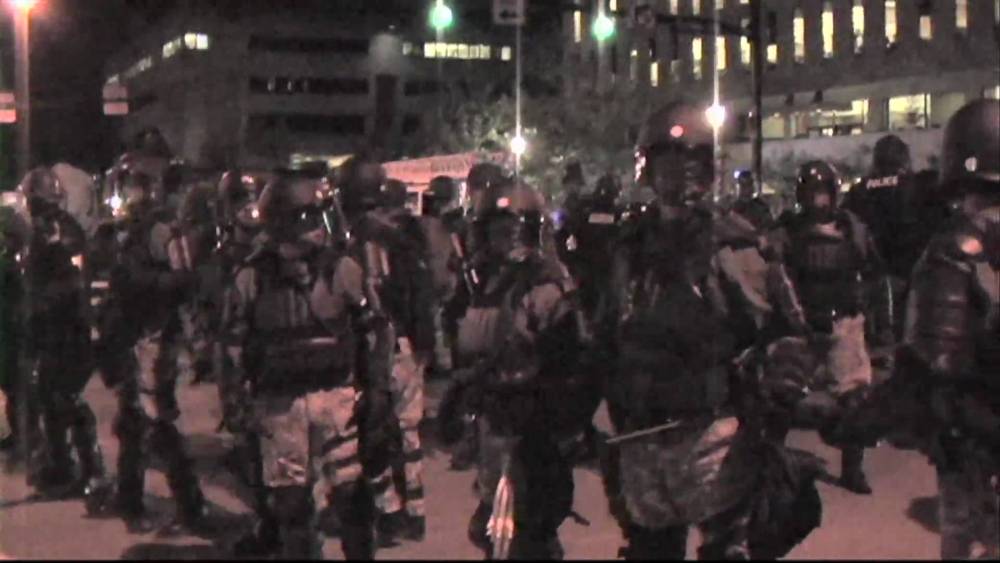
The spectacle is not a collection of images, but a social relation among people, mediated by images.
– Guy Debord, Society of the Spectacle
Power, Routine, Legitimacy
The administration, the University, the student government, the State—none of these institutions wield power.
Power is a relation, a social structure, a logic. It is both the physical and the psychological force of routine, both the pigs’ monopoly on the legitimate use of violence and the racialized colonial alliances that so often complement it. Power is fused within the organization of space; it is the way in which the flow of things and people (in that order) is enforced and reproduced through infrastructural patterns, ritualizing social hierarchies to the point that they become material conditions. “Those in power” are simply the ones enforcing and rationalizing the arrangement, or perhaps slightly adjusting it to better suit the flow of capital.
Routine is a mechanism whose parts can be infused, even conflated, with one’s identity; both the material organization of a space and its accompanying roles and relations are dependent on popular, undisputed participation and faith. We see this in the games of respectability and professionalism played every day on campus. The dormitory resident assistant is your age, but you will never be their peer. How could you be? At any minute, they could receive an order to search your dorm, summon armed men to detain you, get you thrown out of school.
Behind all power relations are a series of affirming images, reproduced ad nauseum on billboards and social media, personalized in the commodified identities sold on shelves and television shows, and circulated by the institutions that assign and define roles and tasks. From your dorm’s overzealous RA, to the cops that he called on the stoners down the hall, “those in power” are really just fronting the aesthetics of power. They would have us believe that they own exclusive rights over arranging and organizing the places we inhabit, or over the deployment of violence to enforce those modes of relations. Look, they have even the shiny badges to prove it!
The continued reproduction of the images, roles, and identities within a given space is only stable so long as nothing interferes with the rhythms of routine. Whether it’s a student refusing to put her cellphone away in a San Antonio middle school, a young man suspected of shoplifting cigarillos walking down a street in Ferguson, or a few dozen Black youth hanging out at a public pool in a white suburb—any potential disruption of the routine functioning of power relations within a space threatens to destabilize the arrangement and function of that space. Which is to say, disruption carries the potential to temporarily rearrange and repurpose a space toward the production of subversive, non-hierarchical power relations.
Since disruption cuts off the dominant relations at the point of production, the social roles that have been granted “legitimate” uses of force are employed as the first line of defense. The student questioning her teacher’s authority is also questioning the relations encoded in her school; the prospect of a suspected shoplifter making off with a few dollars worth of merchandise warrants extra-judicial execution because it challenges the sanctity of property; the presence of Black bodies in a white space threatens a regime of segregation. Behind every identity that categorizes and enforces ways of being, behind every arrangement of space that directs and determines the relationships that comprise things and people, is a latent violence. Disruption exposes this reality, but it cannot experiment with new forms of life without the capacity for self-defense, for counter-violence.
Exercising force is a tactical maneuver in the discourse of legitimacy. The function and arrangement of a space (public school, convenience store, white neighborhood) must encode a distribution of power that considers the agents tasked with imposing it (cops, pigs, murderers) to be legitimate. In the heart of the Empire, spectatorship translates as passive compliance with the rules of the game, as deference to the legitimacy of white supremacist and capitalist logic; in each of the above examples, white police officers savagely attacked young Black people with legal impunity. The aesthetic of power, then, is also the aesthetic of legitimacy: legitimacy is white, he flashes a badge, he wears a suit, he is a professional, he works within the parameters of the law, he carries a megaphone, he is comfortable in his neon-yellow marshalling vest, he is a man.
Genuine acts of resistance make no appeals to conventional legitimacy, to the symbolic terrain of representation, to negotiation with those fronting the aesthetics of power. Rather, genuine resistance leverages force against the material structures that reproduce reality, in hopes of opening new possibilities.
The academic life contains reinforcing counterparts to the way in which extracurricular life is organized… academia includes a radical separation of the student from the material of study. That which is studies, the social reality, is ‘objectified’ to sterility, dividing the student from life…
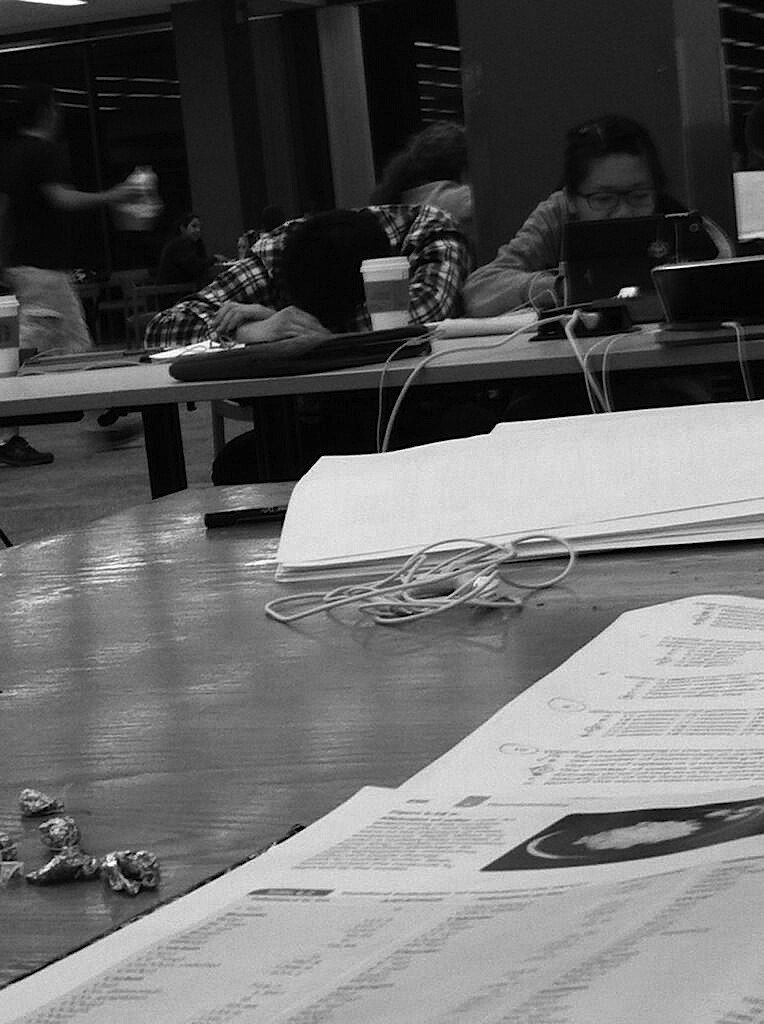 – Tom Hayden, The Port Huron Statement
– Tom Hayden, The Port Huron Statement
Factory, Colony, University
The University is a knowledge factory, a think-tank expanding capital, a colony in the service of Empire: a site of social control.
The University of Pittsburgh, and the surrounding Oakland neighborhood, is a fucking police state. City cops, Pitt police, Carnegie-Mellon police, Point Park police, Pennsylvania State police, and park rangers all have jurisdiction here (and this doesn’t include rent-a-cops like university security). The administration doesn’t even bother trying to cover up the University’s colonial project; Pitt raises tuition every single year, ensuring that each semester brings richer and whiter students to Oakland. Meanwhile, its legion of pigs occupies the remnants of the original Oakland community to stabilize the process. The colony must grow in order to survive; everywhere, the public University is in its death throes, self-cannibalizing in desperate hopes that the commodification of knowledge, paired with the expansion of its consumer base and labor force, might offset the crisis facing the traditional reproduction of the working class.
The social organization of the University-Colony is a voluntary caste system. The material reality of University infrastructure is sustained by the constant reproduction of social roles: student, faculty, employee, administration, campus police, etc. But those mythical identities only exist in relation to the routines of the University. So in order to ensure that social activity on campus is performed in accordance with the proper University-prescribed identities, Pitt must detach Campus Life from Pittsburgh life—the University “community” must exist outside of the society that constitutes it. And even that “community” is itself further divided into separate social groups, from the academics to the service workers, each premised on a series of affirming images. Pitt hoodies and student ID cards insist the spectacle of Campus Life is not simply a ritualized social performance, but a natural order.
So long as social interaction is directed by the logistics of the neoliberal University—so long as the worker’s labor is converted into the administration’s capital, or the student’s research and debt is transformed into the school’s endowments and marketable reputation, or the untenured professor’s job insecurity is realized as another boring-ass slideshow and multiple-choice exam—all relationships will be mediated by the caste system of Campus Life. So long as capitalists are in control of the University, so long as the University is comprised of capital, the University will oppress and exploit.
Campus Life is a frontline in the social war. Its pretensions of colorblindness, gender equality, and academic liberalism are little more than a smokescreen to cover up the fact that the University itself can never be a neutral institution. A cursory glance at Pitt’s track record is all we need to draw lines in the sand. The normalization and legitimization of misogynist and transphobic platforms, the Pitt Police’s protection of sexist bro’s and subsequent harassment of queer students, the administration’s utter inaction in response to campus rape culture—this is not naive ignorance to the reality of conflict. This is partisan activity.
To expand one example, Pitt will never seriously address campus rape culture: not simply because acknowledging the routine violence of Campus Life might detract from the school’s reputation and therefore its income, but also because patriarchal violence is an integral part of the functioning of the University-Colony. Without that constant violence, and without the resistance to that violence being mediated by the relations of Campus Life, the governance of gender cannot be enforced, and patriarchy is left vulnerable to attack. Without that constant violence, the capitalist University might lose out on a highly profitable form of economic exploitation and social control. Some might go so far as to interpret this violence as an unspoken counter-insurgency strategy, where the brutal repression of half the population is so normalized that any resistance, let alone offensive militancy, is unthinkable.
The University is also a factory, and its owners control the means of knowledge production. Neoliberalism insists on reifying education as a product to be purchased, as a private commodity that can be divorced from daily experience and public life. But, of course, Pitt is somehow both public and private. And so some leftists desperately want to believe that education is still a public good to be defended, consequently ignoring the fact that all of the campus buildings (and everything inside of them) are University property…
If Pitt owns of the means of education, then our performance of “student” produces knowledge only as a marketable commodity. We don’t perform research to better understand our world. We don’t go to class for the sake of advancing, unpacking, and challenging our collective knowledge. Pitt isn’t searching for answers to the crises of this civilization. Finals week doesn’t mean shit. College is just work, except that we fund our bosses and get paid in promises. Academic labor is a glorified means of pushing the frontiers of specialization for the sake of economic growth; everywhere, the University promises its city an economic miracle that never materializes, swearing that the tech students are ushering in their very own Silicon Valley. A financial bubble to rationalize the campus bubble.
The true purpose of academic labor is obvious enough when we’re talking about the students with “practical” majors. Geology, engineering, environmental sciences? Training for the fracking industry. Economics, biology, business? UPMC is the new Carnegie Steel. Some cling to the liberal arts college as if it were the last outpost for receiving an authentic education purely in the pursuit of knowledge. Forbes Magazine calls the liberal arts degree the “hottest ticket” to the tech industry.
Each graduating class is the University-Factory’s latest upgrade to its most popular product: the designer labor force. Nearly a decade of state funding cuts can’t be balanced entirely through tuition hikes. Private and corporate donors funded around 62% of Pitt’s budget in the 2015-2016 fiscal year (30% came from tuition and other fees, a meager 7-8% from the Commonwealth of Pennsylvania). These donors, which include corporations like Google and Chevron Oil, don’t shell out cash from the good of their hearts. They want returns on their investments, and Pitt prioritizes its funding accordingly. The University of Pittsburgh’s state-of-the-art Chevron Science Center teaches us commercial sciences that serve the interests of capital, not people.
Pitt’s annual harvest of designer workers is primarily recruited by the same companies that funded their specialized education. The more innovative graduates join the writers of the algorithms—becoming programmers, city planners, UPMC specialists, engineers. The entrepreneurs among them eagerly await the opportunity to commodify what little remains outside of the economy, perhaps producing trendy apps for couch-surfing, socializing, or sex.
But those jobs are reserved for the cream of the crop; the infrastructure that once provided the conditions needed to support middle class life now lies rotting across the Rust Belt. Capital doesn’t know what to do with our generation, and so we’re sent to school for 30 years, locked away in prisons, or left to fight over menial jobs to keep up with loan payments. The majority of us will graduate as indentured servants. Our generation looks forward to settling the frontiers of economic life, where we will labor in the newly colonized fields of the service industry and the sharing economy. Bill Peduto eagerly prepares East Liberty for the new residents Pitt promised him. Like their liberal mayor, white hipster graduates mourn the postponement of the latest Whole Foods and nod excitedly while watching Last Week Tonight with John Oliver.
The ongoing evictions tearing across predominantly Black and working class communities will never end so long as the University exists.
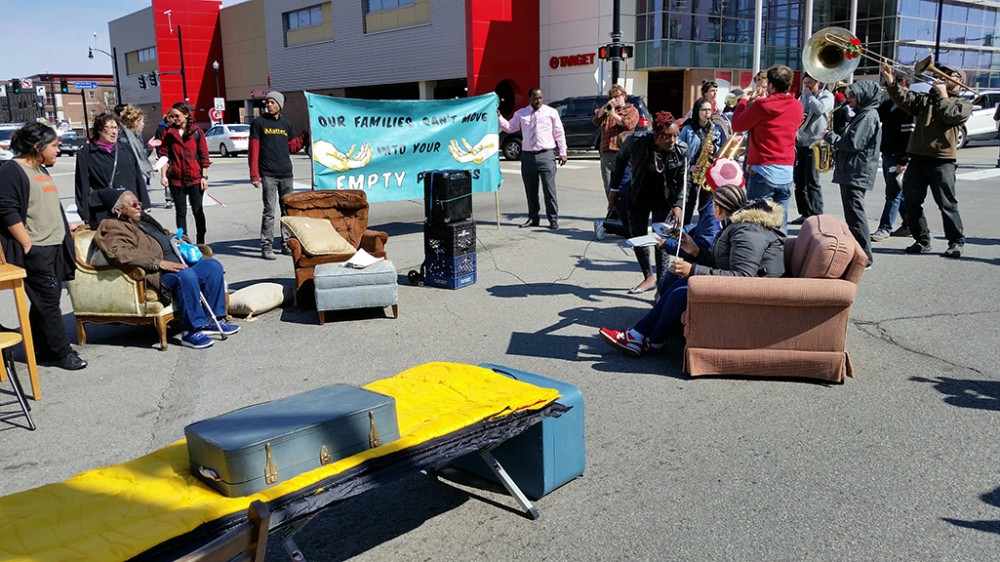
Radicals hardly obstruct this process. After all, Campus Life ensures that malcontents only mimic the appearance of resistance. We end up policing ourselves to build the legitimacy needed for the administration to take us seriously, organizing as “student allies” to abstract identity groups rather than fostering connections with individual workers and faculty, substituting the aesthetics of our countercultures for a concrete break from the images that reproduce Campus Life, working long hours to make Pitt a progressive and democratic university…
Pitt not only accommodates the appearance of resistance, but depends on it in order to stabilize the social groupings that make up the mythical University “community.” The University needs its student labor force to produce the kind of critical feedback that can reenergize and relegitimize its project of technical specialization, capital accumulation, academic centralization, and colonization.
To fight for a progressive and democratic University is to fight for a more brutal and pervasive exploitation, and better ways to disguise it.
Fuck Reality
Until our actions break free from the logic of legitimacy and consensus, until our struggles are oriented outside of all University-prescribed myths – until we openly organize against the University – our anger will be deflected and rerouted into more palatable channels for Campus Life to accommodate.
The interlocking series of myths, the University power structure and its relations, the spectacle of Campus Life that obscures the power structure—these all constitute consensus reality. Consensus reality is more than just the ways of relating that reproduce heteronormative patriarchy, capitalism, white supremacy, state control, specieism, and the myriad other hierarchies that constrain and destroy life. It is also “the range of possible thought and action within a system of power relations… enforced not only through traditional institutions of control—such as mass media, religion, and socialization—but also through the innumerable subtle norms manifested in common sense, civil discourse and day-to-day life” (Terror Incognita 11).
It doesn’t matter what you think so long as you behave, so long as your sense of the possible and your experience of desire does not break with the popular consensus. “Consent discourse presumes that what we want is knowable and can be articulated within the framework of our shared reality” (Terror Incognita 16).
Face it, our reality offers nothing to those seeking liberatory social change. Pitt’s consensus reality offers desires (potential courses of action, wants, needs, ways of defining and creating value) that serve only the interests of the University, of neoliberal capitalism. Nothing new can be built, let alone conceptualized, so long as those in power administer the frameworks in which we experience, express, and define our desires. If we have any hope of connecting our own stories to the growing web of insurgent realities waging social war against this reality, consensus must fracture into open conflict.
It follows that Campus Life can only be subverted in a situation of seductive and genuine participation, where the desire to act shatters the passivity and mediation of consensus reality. Should a number of folks at Pitt find a reason join conflictual spaces that negate Campus Life, which is to ask should they conceive of reality as a collaborative project, as participation in an ongoing war between autonomy and social control, how many might never fully return to their normal routines? Near-life experiences are addictive in that way. Suddenly, momentarily, Campus Life’s professional titles like “undergraduate,” “professor,” or “janitor” might be seen for what they truly are: barriers to forming relationships with others on your own terms, prescriptive categories constricting your capacity to define yourself, for yourself. Permits and property laws might no longer meet the collective consensus requirements needed for their reality to continue getting in the way of potential good times. Grades, bills, and three-day study sessions at the library might stop fucking with what were supposed to be the “best years of your life.”
Seriously, though. I sure as hell wasn’t radicalized after hitting up some student group’s meeting. I’m here because I’m still chasing the high from that first punk show in a squat house basement, that first queer potluck, that first renegade warehouse party, that first unpermitted protest, that first smashed Starbucks window.
For conflictual spaces to be truly dangerous, they must constitute a point of participatory, horizontal connection between as many social margins as possible. This requires mobilizing people beyond your social caste within the University-Colony, subverting the spectacular relations of Campus Life, and actively reorienting struggle in a way that violates consensus reality. Put another way, an effective conflictuality essentially breaks the spell, as a young militant told the cameras in Seattle ‘99. The broader social war is already raging beneath the fragile peace of consensus reality.
Last November, a student-led march ended with a brief occupation of the Litchfield Towers dormitory lobby. We seized a space that exists explicitly for our use, that is maintained through our tuition, and we briefly repurposed that space to suit our needs. We left the lobby peacefully, singing,
Don’t walk in front of me I may not follow,
Don’t walk behind me I may not lead…
As people left, cops detained one kid from a crew that was trying to prolong the occupation by setting up a sound system from behind makeshift barricades of couches and tables. The march returned to the lobby to ensure the student’s safe release, and within seconds the University police brutally attacked the few protestors that made it back inside. The pigs even charged a student with felony trespassing on her own fucking campus.
That night ended with radical questions circulating beyond our countercultural bubble for the first time in recent memory: Do the Pitt Police really have the right to beat the students they’re supposed to protect? Wait, don’t we pay to use that building? Well shit, do the police even have the right to dictate how students use our campus in the first place?
The following Monday, the crisis of legitimacy reached new heights. A broad coalition of campus organizations called for a last-minute rally at the site of the previous week’s police violence. That morning, the administration sent out a text message and an email to every student enrolled at the University of Pittsburgh, warning them about the demonstration. On Towers patio that afternoon, nearly the entire Pitt police force, many donning masks, manned a militarized zone that separated students from the dormitories we pay to maintain. Inside the lobby, the Pitt administration cowered behind their armed guards. Outside, a small crowd of about 50 students, along with a few faculty members and Pitt workers, refused the admin’s sheepish request for us to send a single representative inside for a dialogue with the administrators. Instead, we proposed they come out and join us in the cold, where they would have no opportunity to control us by appointing and manipulating a leader.
The crisis of legitimacy, no longer abstract, was reified in the guns and batons that prevented students from entering the very building many of us call home.
Disruptions, undertaken individually or collectively, can become a force of negation. Disruptions are a threat on the assembly line, in the streets, in the lecture hall; anywhere the logic of capital administers the structure of space. But disruptions are not enough. As Franz Kafka reminds us, “From a certain point onward, there is no turning back. That is the point that must be reached.”
An occupation is the realization of the threats we make through disruption. To occupy is to strike, to remove a material place from capitalist time and space, to derail alienated activity and ride its inertia off the tracks, to rip open latent contradictions in the fabric of consensus reality. When we occupy, we create a base from which to launch new negations, but more importantly a subjectivity that is actively experimenting with new forms of life.
Disruption, negation, experimentation, occupation — the suspension of routine and rhythm, the conversion of a thousand plagiarized, angst-ridden zines into something terrifying and new: the insurrectional desire to experience unmediated forms of life here and now, to live communism and spread anarchy.
In a university that also operates within (and maintains) consensus reality, orienting action as a search for conditions that might solidify and circulate anti-capitalist relationships is more than mere prefiguration. It ensures the reproduction of alternative social ties, spaces, ideas or desires as an offensive tactic. It is an attack on isolation: an opportunity to share our experiences with one another, to celebrate our differences, and to expose the real lines being drawn in the social war. Elaborating insurrectionary potential requires more than blockading the flow of relations conducive to capital; it is a process of reorienting relationships and shared spaces towards the creation of new and transient collective realities. In other words, we must constantly recreate a “we” that isn’t a lie.
The crisis sparked by the brief occupation of the Litchfield Towers lobby drew lines in the sand, and suddenly kids from both populist and autonomous scenes found themselves sharing a declaration of “we.” The front page of the Pitt News read, “Students, administration clash over Thursday night protest.”
The front page of the Pitt News read, pick a side.
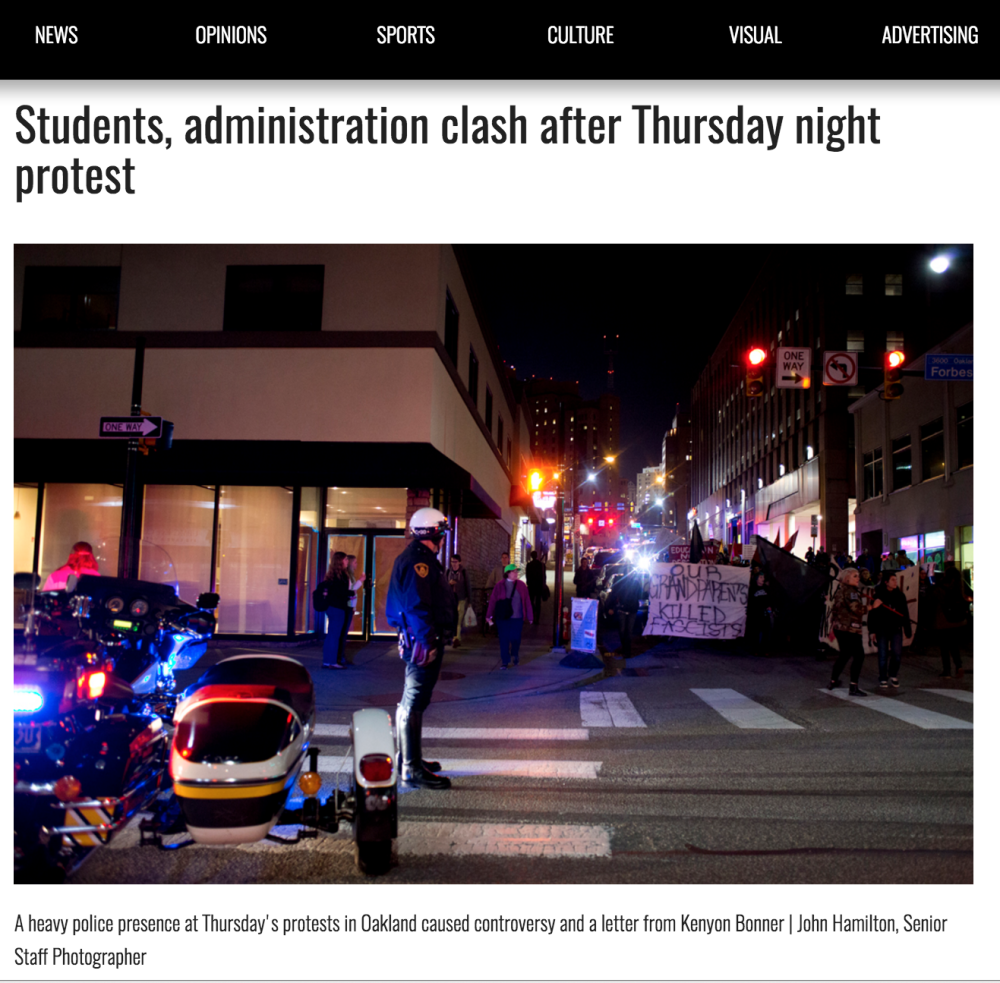 It’s been two years since the fabric of Pitt’s consensus reality really started fraying. In April of 2015, 78 Pitt faculty signed a letter protesting neoliberal-Playboy Chancellor Gallagher’s call for “Making an Impact Through Commercialization.”
It’s been two years since the fabric of Pitt’s consensus reality really started fraying. In April of 2015, 78 Pitt faculty signed a letter protesting neoliberal-Playboy Chancellor Gallagher’s call for “Making an Impact Through Commercialization.”
Keeping knowledge free is in our own professional self-interest. The open and free exchange of research and data is essential to advancing scientific knowledge, and commodification threatens this fundamental principle of scientific inquiry…
In addition, universities are increasingly subject to pressure from their corporate “partners” to manipulate, suppress or simply avoid research that counters the interests of those who fund it…. We must be prudent in devising strategies for the production and dissemination of knowledge that maintain intellectual integrity, are inclusive rather than exclusive, and that create opportunity for and empower all members of our communities.
The university is one of the few places where our society might find leadership in developing the ideas and models we need to re-orient society in ways that can help to ensure that everyone today and in future generations can share in the benefits that so many of us at Pitt enjoy.
In 2017, our teachers are no longer on the defensive. The faculty and graduate students are both organizing with the United Steelworkers, with many comrades among them. But in order for these efforts to force a rupture that reveals the social war raging behind every new Starbucks and tuition hike, radical agitation should also shift to the offensive. The discourse of Progress and Democracy is especially dangerous after the election of Donald Trump. Radicals working within reformist groups need to exploit the heightened polarization and emphasize an anti-fascist framework if they want to prevent liberals and Trump-collaborators from pacifying these campaigns. The radicals on the outside need to familiarize themselves with the new social terrain, identify opportunities for militant disruption, constantly reevaluate their ideas of autonomy, and develop a broader strategy for circulating alternative social ties and desires. If we can’t generalize such a conceptual shift soon, popular consensus will normalize not only the Trump regime, but also the impending escalation of reactionary violence and State repression.
On our end, student-faculty and student-worker solidarity efforts are almost exclusively defensive, not to mention predicated on the relationships between self-appointed representatives of abstract identity groups. Fighting for specific reforms that could help our friends survive in the short-term is no substitute for finding ways to meet those needs ourselves: a gradual accumulation of concessions will never outpace the march of neoliberalism and the resurgence of fascism, let alone offset the rising cost of living. Conventional approaches like “raising awareness” about issues like union neutrality, the far-right, shitty wages and tuition hikes are crucial in base-building, and they could potentially present a counter-narrative to the administration’s justifications and propaganda. But waiting around for the University to fuck up on its own isn’t going to start the insurrection.
“If you want to force a change,” Milton Friedman advised his Chicago Boys, “set off a crisis.”
~ II ~ Dead Ends
The same people who practice “critique” are also the most susceptible to cynicism. But if cynicism is simply the inverted form of enthusiasm, then beneath every frustrated leftist academic is a latent radical.
– Communiqué from an Absent Future
There is a peculiar grasp of method in the student organizing scene: the student group, the coalition, the teach-in, the petition, the letter-drop, the buttons and felt squares, the op-eds, the one-on-ones, the classic A-to-B march around Oakland, the discourse of accessibility or of buzzwords (intersectionality, systemic, anti-oppression, safe(r) space, self-love, revolutionary, collective liberation, community, consensus). Yet despite all of the base-building and the “meeting-people-where-they’re-at,” student groups at Pitt rarely break out of the initial education/negotiation stage of a campaign.
Each year’s new organizational leadership is drawn from that small base of students who spent their time as underclassmen slowly building their organizer cred: attending panel discussions and meetings, doing grunt work like flyering or gathering signatures, and then (maybe) hitting the streets during the occasional national mobilization. And each year the new board members, steering committees, core collectives, presidents, and “philanthropy chairs” mount their pylons of networking in-crowds and NGO internships only to gape helplessly at the massive turnover of the next semester.
For the student radicals working within reformist organizations, campaign strategies are inherited from the upperclassmen that bought them beer back when they first got involved. It’s chic to vaguely identify with anti-fascist and feminist politics, but some organizers cringe at –isms and are always sure to lecture newcomers on why it’s alienating to reference political theory. The only acceptable discourse is that of Progress and Democracy, which offers few tools for critiquing reform campaigns, but plenty of buzzwords for drafting petitions.
For the students who don’t try to disguise their analysis in the language of bourgeois populism, an unrelenting emphasis on intersectionality, autonomy, and horizontalism is the only authentic way forward—although nobody’s quite sure what these things look like in practice. This crowd is often lazily defined as the millennial activists; youth who conflate “organizing” with a directionless activism that is marred by ideological purity, adventurism, and (an admirably merciless) militancy. It’s a tired critique, but it definitely rings true whenever our organizing efforts and direct actions are oriented towards public visibility, rather than their emotional and material impact on both the community we long to build and the reality we despise. Besides, if the goal of an action is purely symbolic or designed to attract media attention, it ends up being little more than an impatient and unsuccessful populism (see: Democracy Spring).
Whatever way you spin it, student radicals in Pittsburgh are experiencing a degree of strategic polarization comparable to the tensions within highly mobilized campuses. One camp is acting out the politics of a populist routine, the other performs a pseudo-radical spectacle: one is base-building around modest demands without ever actually escalating, the other rides shotgun to trending hashtags from the latest revolt; one is checking off boxes on the never-ending list of “somethings” to accomplish before the final crisis of capitalism, the other desperately reblogs every adventurous breach in the anxiety of the everyday.
That being said, this section is not intended to define these tensions within some false dichotomy of “activists” versus “organizers,” or “autonomists” versus “populists.” Rather, I hope to challenge radicals working within one or both of the two most prevalent discourses (Progress and Democracy and Social War), to critically evaluate their relationships to the organizational frameworks, identities and desires produced by consensus reality. We won’t build momentum through the reconciliation of abstract tendencies, but there’s a chance things might start rolling if frustration can be articulated as the need for experimentation, or if the struggle to get out of bed nurtures a spirit of negation. [1, 2]
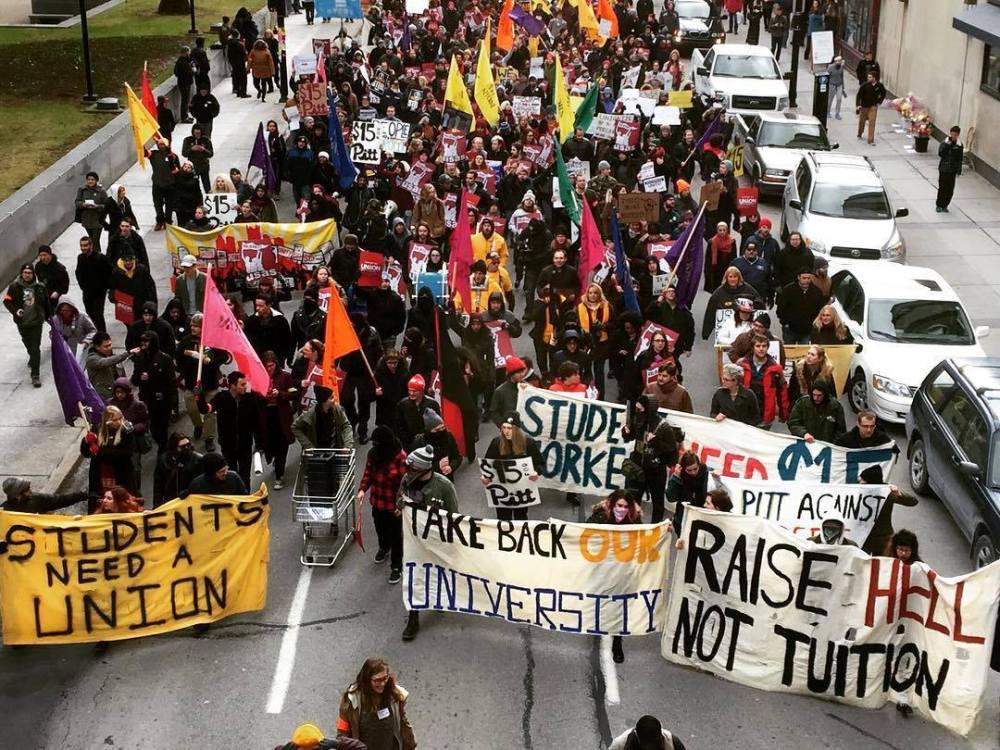
Critique illuminates all the errors of a society that its managers have overlooked. It is the perfect interlocking mechanism of stagnation, stunting the growth of burgeoning, subjective revolt by offering one a whole buffet of irresistible, irrelevant options for “change.” A release valve for intellectual dissonance, critique today resembles the state-sponsored “strikes” of communist countries, where the desire for resistance is satiated by a regimented diet of acceptable means of conflict, supervised by its very enemies.
– Preoccupied: The Logic of Occupation
The Populist
It’s true that the populist camp’s suspicion of ideology is a positive development. The tragedy of the 1960s is often told with fingers drawn at Maoist vanguards or lifestylist dropouts and escapist communes. But at least in the ‘60s you could generally figure out what the fuck it was that the people working with you really believed in. The problem today is that just about every populist, reform-oriented student group is a “Big Tent” organization, except that instead of involving the coordinated effort of multiple theoretical tendencies, there’s just a vague political spectrum that goes from “sorta liberal” to “hella radical.” With this in mind, it makes sense that the default discourse for most student groups is that of Progress and Democracy.
Regardless of one’s place in the spectrum, the ambiguous and moralistic populism surfacing alongside the Progress and Democracy discourse is now developing as an ideology.
The populist, much like their cultural mirror in the hipster, is quick to shed or appropriate new political aesthetics, shrugging off any attempt at classification with the flick of a hand-rolled cigarette. The absence of any theoretical framework or clear ideological affinity within student groups leads many organizers to act out populism as a sort of cautious defeatism, often under the guise of being “realistic” or “patient.” Populism is encouraged by the Unions and NGOs that assign demands to student front-groups, administer the organizing frameworks, and then recruit and fund young radicals. This practice is typically rationalized with talk of building power through a gradual procession of concrete “wins” and creating accessible, entry-level political spaces. Such arguments ignore the reality of the situation: most student organizations are reproducing the logic of capital.
Not merely capitalist logic, like equating brand recognition with public support, or choosing tactics based on the input of popular opinion (read: market research), but the logic of capital. The organizational leadership determines and enforces the character of the individual organizers’ productivity, extracting surplus value from their activism in the form of social capital, brand recognition, and financial donations or grants. The organizers’ productivity itself is valued according to event turnout, or by the sympathy that the student group wins from the administration (which is to say, the organizers’ efficiency in siphoning the inclinations of individuals into an agenda the student group controls). But most of all, the logic of capital emphasizes its own never-ending reproduction, of the definition of “activism” as it exists within the confines of Pitt’s consensus reality. Reformist organizations are ultimately conflating quantifiable “wins” and concessions with building movement momentum, conflating the range of possible reforms granted by the discourse of Progress and Democracy with the process of improving material conditions. Consequently, radicals working within the populist camp face a much higher risk of being co-opted; many end up adopting populism as an ideology, rather than using it as an accessible discourse for organizing conflictual spaces and materially supporting the people that inhabit them.
At Pitt, each and every student group is competing for our participation. Students really don’t have much free time, so of course it’s easier to focus on the things that are immediately accessible. Genuine concern for the working conditions of the people who create the products we consume translates into pressuring the administration to divest from this or that unethical company, or perhaps into individual choices like shopping fair-trade. But are these viable solutions? Now that the campus bookstore has a friendly face, the University can resume profiting from its brand name and new progressive image, and the “ethical” companies can continue selling their particular brand of green capitalism. Having a clean conscious is far too often a luxury that comes with the kind of price tag few can afford, although taking out loans is always an option. Good intentions are sabotaged by reality.
Time constraints force student radicals to narrow our rage into a single issue, or else risk overextending ourselves and sacrificing our mental health. After we’ve chosen a focus, reformist groups shape and mold that rage into a passionate-but-reasonable simmer in order to appeal to a broader audience. Each single-issue organization must specialize its labor force, lest its workers distract from the campaign narrative, or (god forbid) start assuming tasks that are generally reserved for the top-dog organizers, such as making PR decisions, organizing meetings and actions, networking with other groups, and writing propaganda pieces.
Sound familiar? That’s because it’s the same logic of our neoliberal education. Students’ skills are specialized during a point in our lives when we should be exploring our interests in ways that aren’t predicated on utility or dictated by specialists. I’m not trying to suggest there’s something inherently wrong with becoming skilled in a field, or committed to winning a demand, and it’s not like students have spare time to dedicate to every hobby we entertain. But just as students cannot keep ignoring the ways in which our education is centralizing knowledge production and training us for participation in the capitalist economy, the radicals working for populist organizations cannot keep ignoring the ways in which reformist campaigns are centralizing agency and training organizers for careers in the non-profit industrial complex. The liberal tendencies within student groups are dangerously close to monopolizing dissent on campus, and the populist discourse of Progress and Democracy is turning well-meaning radicals into another specialized class of students telling other students what to say and how to act.
Seriously, are there any radicals working in the populist camp that haven’t been lectured by some condescending liberal about cuss words and respectability? Hasn’t everyone heard an older, more “experienced” organizer exaggerate a sigh before vapidly explaining the difference between essentialist abstractions?
- Between the “ill-timed” actions that are too disruptive/confrontational/alienating, and the merits of more “strategic” tactics, such as symbolic protest or asking super tough questions;
- Between the events and meetings that are too broad or open-ended, and those that are building the movement (or rather, their organization);
- Between the “good allies” passively following the instructions of a certain identity group’s self-proclaimed “leaders” (as if everyone within that identity has the same interests and beliefs as those that speak on their behalf), and the “bad allies” actively prioritizing social and political affinity?
Let’s not even bring up the violence vs nonviolence dichotomy…
The problems with the populist camp only amplify with scale. At the individual level, populist frameworks for activism and organizing do little to challenge the desires and social roles allowed by the University’s consensus reality. At the organizational level, the student group is structured by the relations of capital and thus depends on the perpetual specialization, reproduction, and exploitation of labor-power. The discourse of Progress and Democracy produces a populism that is both ideological and anti-theoretical, confining student groups to reformist narratives whilst depriving the radicals within them of the ability to collectively evaluate their efforts in relation to a broader vision for revolutionary change. When viewed as a whole, it’s clear that there is a widespread deference to the sorts of actions, decision-making processes, people, and ideas that are perceived to be “legitimate” within the campus Left; meaning that the majority of student-led campaigns—successful or not—do little to disrupt the Spectacle of Campus Life, cultivate actively (as opposed to passively) desiring individuals and collectivities, or subvert the myths that uphold Pitt’s consensus reality. The heteropatriarchal / white-supremacist / neoliberal University’s ongoing colonization of social and economic life remains unchallenged at best, reenergized and re-legitimized at worst.
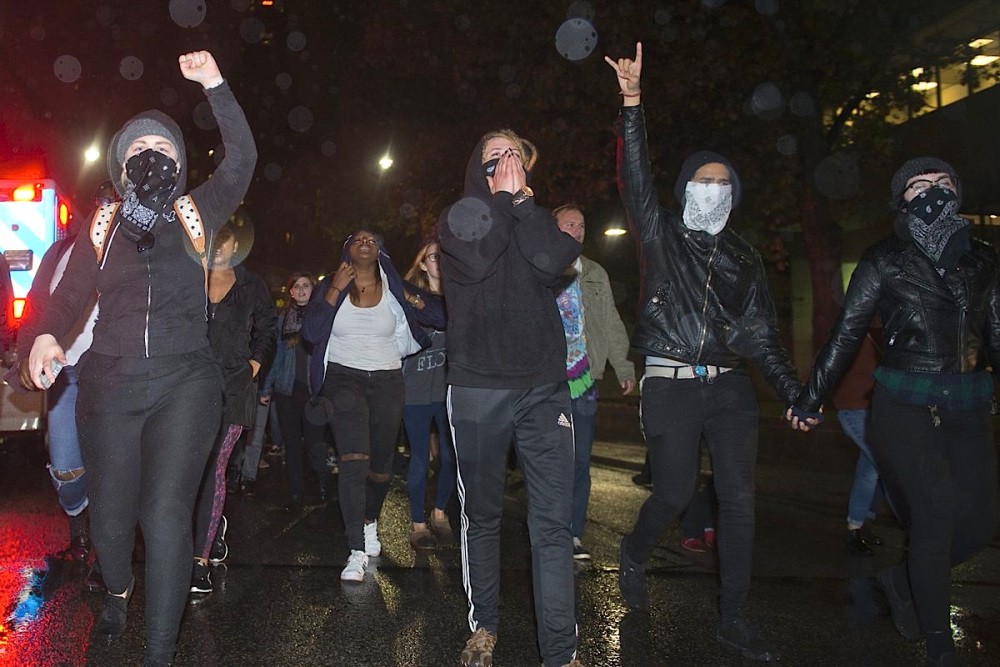
We seek to push the university struggle to its limits. Though we denounce the privatization of the university and its authoritarian system of governance, we do not seek structural reforms. We demand not a free university but a free society. A free university in the midst of a capitalist society is like a reading room in a prison; it serves only as a distraction from the misery of daily life. Instead we seek to channel the anger of the dispossessed students and workers into a declaration of war.
– Communiqué from an Absent Future
Reactive Autonomy
The emergence of an autonomous scene at Pitt is not the result of the spontaneous self-organization of radicals. In this early stage, it is a reaction-formation to the alienation of both Campus Life and the Populist Left.
Under Campus Life, each layer of alienation is turned into a private war with boredom, anxiety, and misery. The Pitt employee’s creative power is wasted on a 40-hour week of swiping IDs for students who will never learn his name. The adjunct professor must compete with her colleagues for a position, and even if she lands the job she’s not sure if she’ll be able to put food in her kid’s lunchbox. The student, perpetually intoxicated (if not through substance use, then through the countless other opiates sold to us), ironically satirizes and downplays the desperation underpinning their every attempt to balance life priorities—to finish class assignments, to keep in touch with distant relatives and loved ones, to calculate just how many hours of their life they must sell just to pay off their loans, to grapple with the scale of just how fucked we all are, to feel intimacy beyond the games of social capital and political manipulation. Everywhere, a quiet resignation to routine.
To be politically engaged, to root for one brand of elite interests against another, is no less a resignation to routine than going to work in the morning. To organize for University reform, to beg for the privilege to play faithful advisor to the administration’s strategic plan, is more of an endorsement of neoliberalism than an indictment.
Last year’s “strategic forums” once again channeled student anger into mediation, representation, and routine. The potential for a multi-front confrontation with the administration was outright squandered by a few prominent organizers, who leaped at the opportunity to represent the student body as student-advisors to Pitt’s strategic plan. In response to the populist left’s blatant complicity with these self-appointed student leaders and the administration’s recuperative efforts and propaganda, a few small crews of students broke away from their student organizations. Some of us opted to call for an alternative, autonomous “student action forum.” We thought the forum would create a space for students to discuss and self-organize around the issues closest to them. The forum was a flop (someone please remind me to at least hit up like a facilitation training or something before I ever try to call another general assembly), but it was also a turning point.
Autonomy attracts us because we’ve seen its potential to transform one’s sense of individual and collective power, to seduce spectators into active participation: its potential to inspire others to search for liberatory experiences and projects on their own terms. But autonomy is also a process. It requires intentionally theorizing and experimenting with our conceptions of autonomy in order to determine what practices will result in the active provocation, solicitation, and circulation of contradictory and complementary insurgent desires. Without continual experimentation and negation, without an intention that goes beyond “fuck that liberal bullshit,” we become passive consumers of the aesthetics and practices associated with autonomy, all the while reproducing the same relationships and arrangements of space that centralize power, agency, and legitimacy. In other words, we can cling to “spontaneity,” “horizontalism,” or “self-organization” (abstractions likely passed down from Occupy) all we want, but these words are practically meaningless until we start to facilitate spaces that provide the skills, platforms, tools, dialogue, material and emotional support required to inspire and nurture spontaneity, horizontalism, self-organization, autonomy.
The radicalism in our autonomous scene is reactionary primarily because it fails to break from the frameworks we are reacting to. Just because Pitt doesn’t recognize our crews as legitimate student organizations and none of us have “club presidents” doesn’t mean anything’s changed. The reactionary autonomist stagnates with their radicalism as an aesthetic; they parade their consensus processes, rowdy actions, militant rhetoric, nominally non-hierarchical meetings, and discourse pissing-contests in order to disguise the fact that they are reproducing the same organizing styles found in the populist camp, albeit with a sexier attitude.
If you think I’m projecting, that’s because I am.
How I became an organizer and started hurting people I care about.
Four years ago, my first real week spent “organizing” on a campaign ended with a series of banner drops that were timed to coincide with an SEIU strike. Shortly after, the more “experienced” student organizers suddenly stopped working with me. I found myself on a sort of unspoken blacklist after word got out that I allegedly dragged barricades into the street and vandalized University property with labor slogans. It was my first real mobilization; I honestly had no fucking clue what the word “escalation” implied, or how my actions might have made the campaign look bad. All I knew was that I wanted Something to happen, and that my decision to act on that desire managed to piss a good number of people off.
I still tried to be involved; I kept turning up at meetings long after I had stopped participating in any meaningful way. The older organizers gave me the cold shoulder, and I would leave early to cry alone in my dorm, or to smoke weed with you under the bridge in Schenley.
I don’t know where I’d be now if we hadn’t found each other. Like me, you were alone, stoned, and binge-watching that super dope first season of Vice on HBO. We rolled into every Free the Planet meeting high off our asses, even though we felt pretty unwelcome showing up there anymore. We spent most nights together, smoking by the Shrine under the bridge, throwing illegal bonfire parties on the lake by the train tracks, hitting every basement show at Bates Hardcore Gym, tripping face – sometimes twice a week – on Flagstaff Hill, passing around that grimey notebook I eventually scanned and printed as the second issue of Filler. I still remember holding your frostbitten hands as we climbed down from the roof of Towers Lobby; fifteen minutes spent fumbling with frozen wire, trying to drop our first banner together in the middle of a blizzard.
Months after the coalition splintered back into its original organizations, we realized we were still admins of the Facebook page. We hijacked that shit and told ourselves that we’d use it to organize differently, that we’d encourage militant action instead of shaming it, that we’d push the student movement toward the attack. We called for the first explicitly anti-capitalist march on Pitt’s campus since Occupy imploded, and all 40 of us marched for two blocks down the sidewalk…
Some older Pittsburgh radicals took notice, but despite their help we still had no idea what the fuck we were doing. We stagnated as those angry kids yelling on street corners, we fractured after our “formal” accountability processes proved worthless. We dedicated the weight of our emotional energy to the mere maintenance of our tiny organization before burning out one by one… by the end of the semester, we all retreated back into our respective countercultures.
We don’t talk much anymore, but it’s still comforting to read through the goofy shit you wrote in our notebook,
People come and go, it’s never going to change.
But those times were still fun, and probably really strange.
By the end of 2014, I was slowly plugging back into the populist scene, albeit as part of a different student group. This time, I took their organizing trainings to heart, convinced that our failure to organize autonomously stemmed from a lack of organizational formality. I began rehearsing my interactions with people to the point that they were script-like, my voice echoing the cold, indifferent speech I picked up while attending countless meetings. I complied with every request to bottomline bullshit tasks; I found myself competing with the other underclassmen to get the most petition signatures in hopes that the older organizers might take my politics seriously.
It wasn’t all that long before a new “we” broke away once more to organize autonomous action, yet by that point I had already turned into a “serious” “organizer.” We threw benefit parties, but I stressed over attendance numbers and the zine table instead of enjoying myself and catching up with friends. We called for general assemblies hoping to inspire intersectionality, or to present alternatives to the administration’s “strategic forums,” but really I just wanted everyone else to adopt my proposals and integrate their work into my own vision for a student union. We organized Share Fairs and Really Really Free Markets to build community and practice mutual aid, but I secretly valued people for the material items they contributed instead of the energy they brought to the space. We wiggled our hands in all the gestures of consensus process, but it was always the same people proposing ideas and facilitating the meetings. I adopted all the aesthetics of radicalism only so I could pretend that I was creating space instead of taking it.
Still, this new scene had real momentum, and it was only a matter of months before some of us started conspiring to escalate a populist march. The escalation was part of our plan for a series of autonomous interventions in the 2016 United Students Against Sweatshops convergence, which the Pitt chapter was putting in hella work to host that year. We thought the convergence presented an opportunity to push a national organization, with chapters on dozens of campuses, in a more radical direction… but also, like, personal politics. After the populist radicals found out about our plan, they invited me to the organizing meetings for the big march. Finally! I had been given a seat at the table. People were taking our mess of an informal coalition seriously! I didn’t even mind when I noticed that the list of participating organizations printed alongside the meeting minutes concluded with “oogles” where it should have read “Pittsburgh Student Solidarity Coalition.” I mean, shit, that was pretty funny.
But then the professional organizers started telling me what they needed “my” “organization” to do, and somebody gave me a clipboard. Which was, of course, the last thing my ego needed. When the big day came, I indulged my newfound legitimacy and took my place alongside the other march marshals. Clipboard in hand, I micromanaged each step my friends took, hoping to control every beat of the march so I could pull off a pointless escalation that was, in all honesty, motivated more by personal politics than a strategic vision. When the time came for the autonomous crews to escalate, no one followed the plan, because by then it had become my plan. I was too busy sulking to notice the circle of young radicals forming around the Food Not Bombs shopping cart. I didn’t recognize it at the time, but free food and a black flag did more to spark an autonomous scene than a strictly choreographed extra fifteen minutes in the street ever could have. Most of those kids are now close friends and comrades.
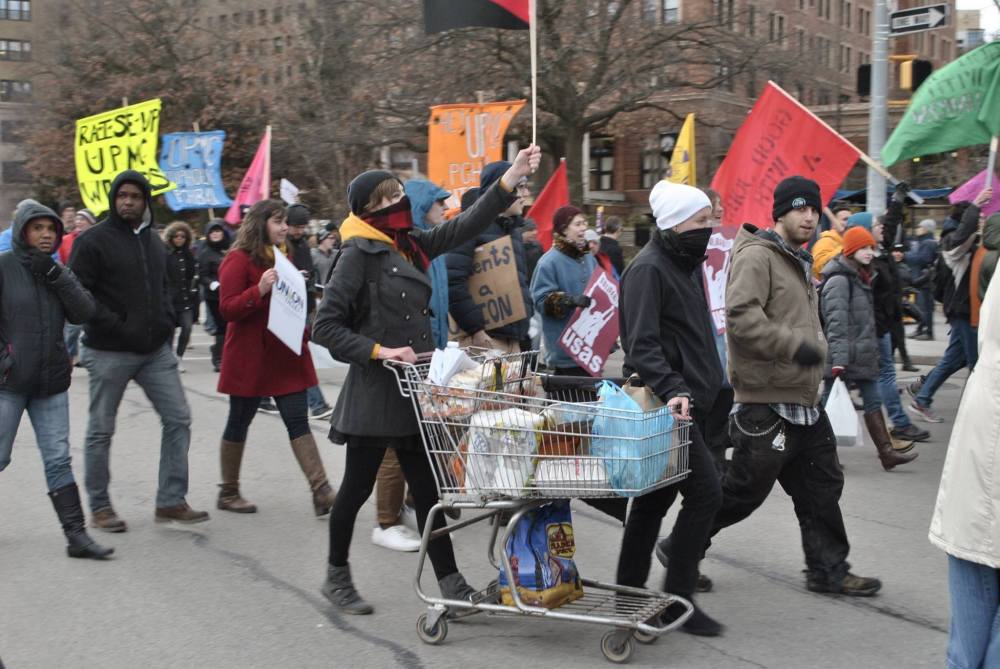
It is not a question of choosing between these two sides, nor of synthesizing them, but rather of displacing the priority of this opposition. The real dialectic is between negation and experimentation: acts of resistance and refusal which also enable an exploration of new social relations, new uses of space and time.
– “We are the Crisis” in After the Fall:
Communiqués from Occupied California
Incite, Conspire, Diversify
The autonomous scene has grown exponentially since the USAS convergence. There’s no sense in constructing some fancy framework for analyzing our interpersonal relationships, as my use of the phrase “autonomous scene” is simply shorthand for a series of overlapping networks (of organizations, informal crews, circles of friends, accomplices, codefendants, bitter enemies) that are, to varying degrees, coalescing outside of the mediation of University-affiliated student groups or political parties. The “autonomous scene” is an intentionally vague phrase, and it’s far bigger than any of the various acronyms we use to form social clusters within it.
Our anxiety, boredom, and misery inhabit a critical historical moment. Our relationships are indisputably militant, as every time we manage to really, truly connect with someone, it’s because our realities merged along some plane of revolt against isolation, mediation, domination, control. Even the administration can’t ignore that “we” are experimenting with the communization of our segregated realities—that “we” are learning how to, if only briefly, create autonomous spaces in which there really is a “we.” And we want more.
If defining the scene in concrete terms risks suppressing its potential to nurture relationships that don’t fit neatly within Campus Life, then how can it be critiqued? Without a clear picture of what counts as being a part of “the” autonomous scene, without formal specialization or hierarchy, how can we generalize a shared perception of our situation? What sort of frameworks for decentralized coordination can extend beyond our immediate social circles, when we struggle to do so even on a scale as small as Pittsburgh’s radical youth scene?
The social war is already all around us. It’s not a question of merging the various social and political circles into some unified campaign, but of facilitating the realization of mutual desire.
Find each other, because the Something we’re waiting for is never going to happen unless we become Something. If each of us acts on our own ideas and desires, a shared perception of our situation is temporarily understood every time we act collectively—every time we create spaces, projects, and experiences together. Which is really just a roundabout way of saying, what you do or don’t do makes all the difference.
In California, the kids spray-paint We are the Crisis on the walls of occupied lecture halls. In Greece, they write We are an Image from the Future.
What could “we” be?
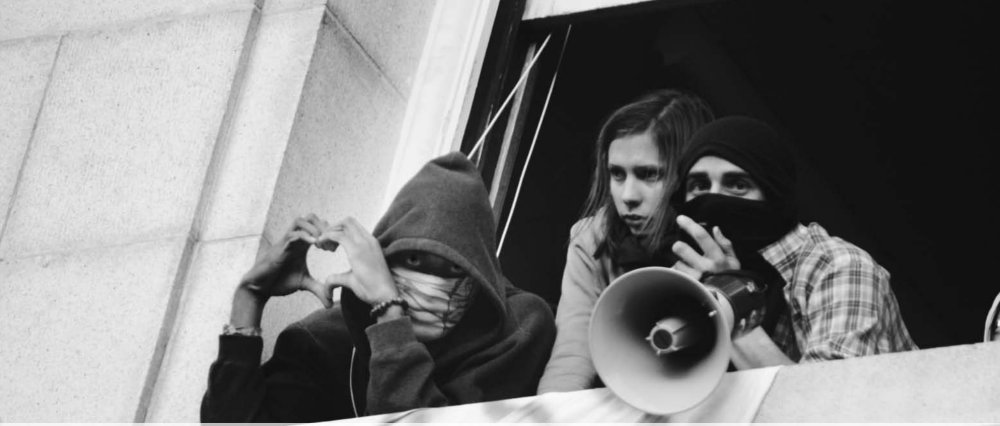
“We aren’t revolutionaries, but we are the revolution.
And sometimes I think that the whole movement is just me and you…”
Appendix
There is at least one practice worth prioritizing and refining. Healthy doses of introspection, taken alone or with the guidance of trusted comrades, might be a step in the right direction. Some questions I find myself habitually returning to:
- What are my short-term and long-term objectives? What are the first steps, and how can I take them while staying true to my beliefs?
- Does my current project require bringing in, training, or even radicalizing new people? Or can it be better accomplished with a few close friends who are already on the same page?
- Am I making time and space to hear my comrades’ criticisms, to learn together, and to unpack each other’s shit?
- Is this crew/organization a closed collective with a formal process for integrating and welcoming new people? Should there be a separation between public events and collective meetings? What sort of decisions are made in these spaces, and how are they made? Is everyone in the crew/organization participating in planning the next public meeting/event, and if not, what’s the difference between being a member and part of the general public? Are there informal hierarchies that negatively impact the participation of others? Yeah, no shit there are, so what are you going to do about them? What’s the most strategic way to address them?
- When was the last time I revised my personal theory of change? How can my crew and I intervene in campaigns that seem to be stagnating? Are my organizing efforts, actions, and events actually getting me closer to any of my objectives?
- Is my crew prioritizing its abstract “organizing” work or its participation in an organization/campaign over its capacity to emotionally and materially support the people that comprise it?
- If my crew for this project is just me and two friends, is there consensus on whether it’s actually necessary to form or participate in a formal organization? How is everyone doing on, like, an emotional level? Maybe it’s time to just chill and enjoy each other’s company for a bit?
- Am I building affinity through trust and compassion? If not, how can I create space for healing?
- Am I having fun? Am I getting enough sleep? Am I falling into the trap of capitalist conceptions of productivity?
[1] So, what is capital? Fredy Perlman defined capital as, “…at once a name for a social relation between workers and capitalists, for the instruments of production owned by a capitalist, and for the money-equivalent of his instruments and ‘intangibles,’ …” Capital is a social relation that necessitates the use of things in a specific way, and it is those things in so far as they are directly reproducing this social relation in the process of value accumulation. As Marx emphasized in the Grundrisse, capital must be understood as a process. Marx defined capital variously as “a social relation of production,” “value in process,” “a Moloch,” “accumulated labor,” and most poetically as “dead labour which, vampire like, lives by sucking living labour, and lives the more, the more labour it sucks.”
– Jan D. Matthews, An Introduction to the Situationists



